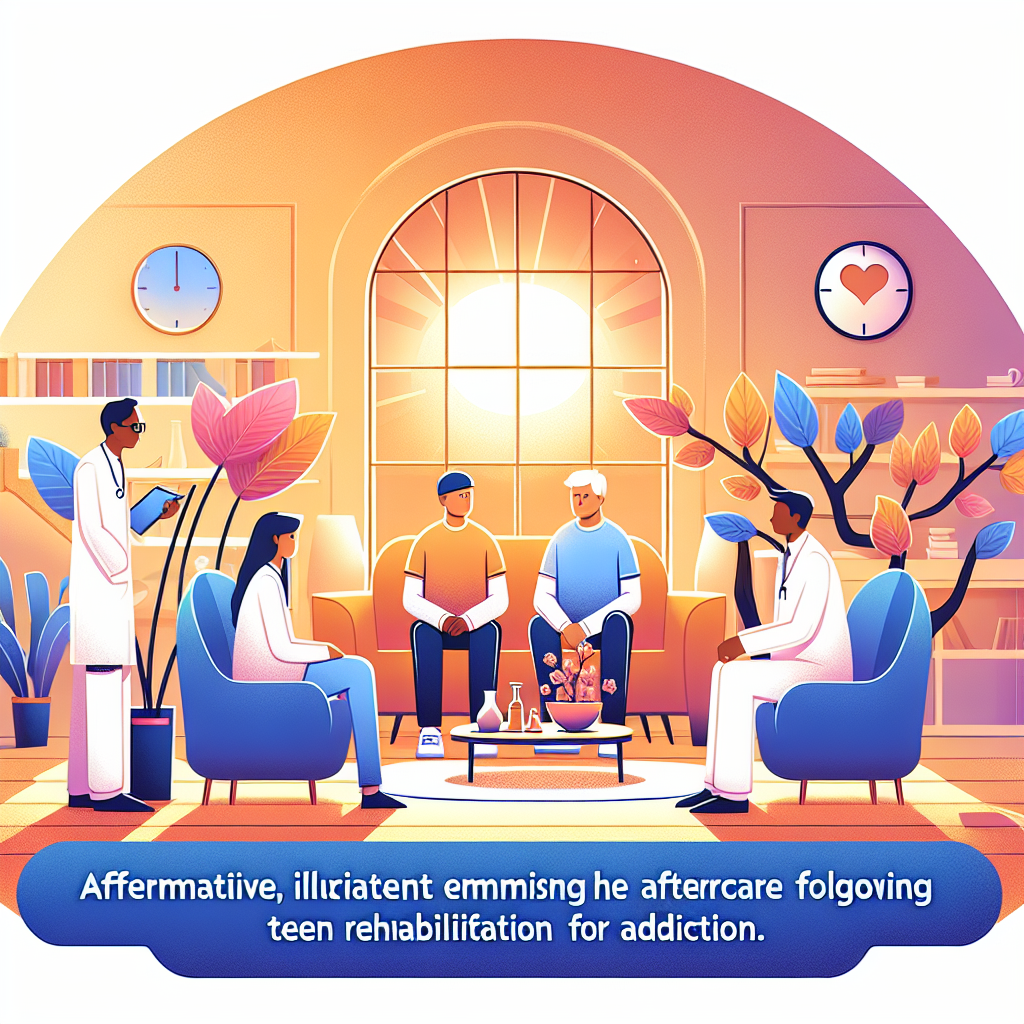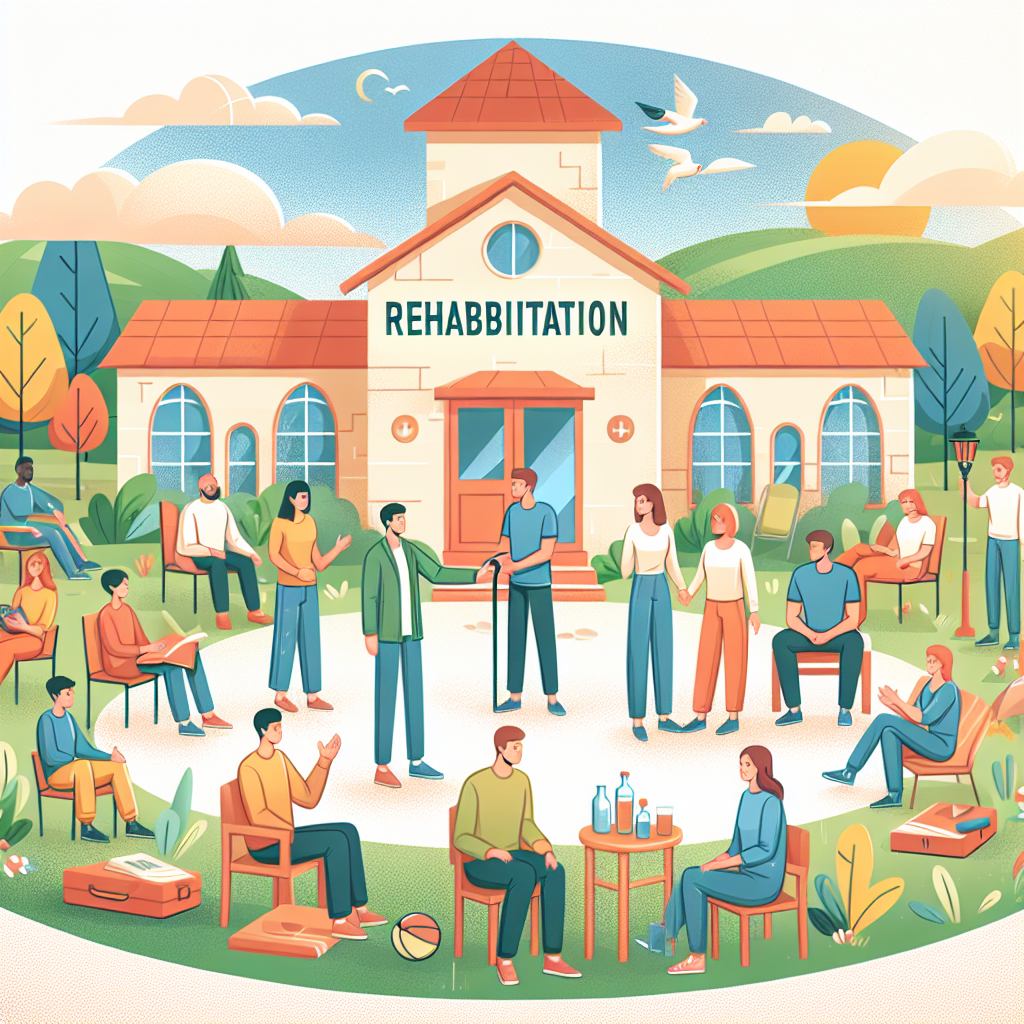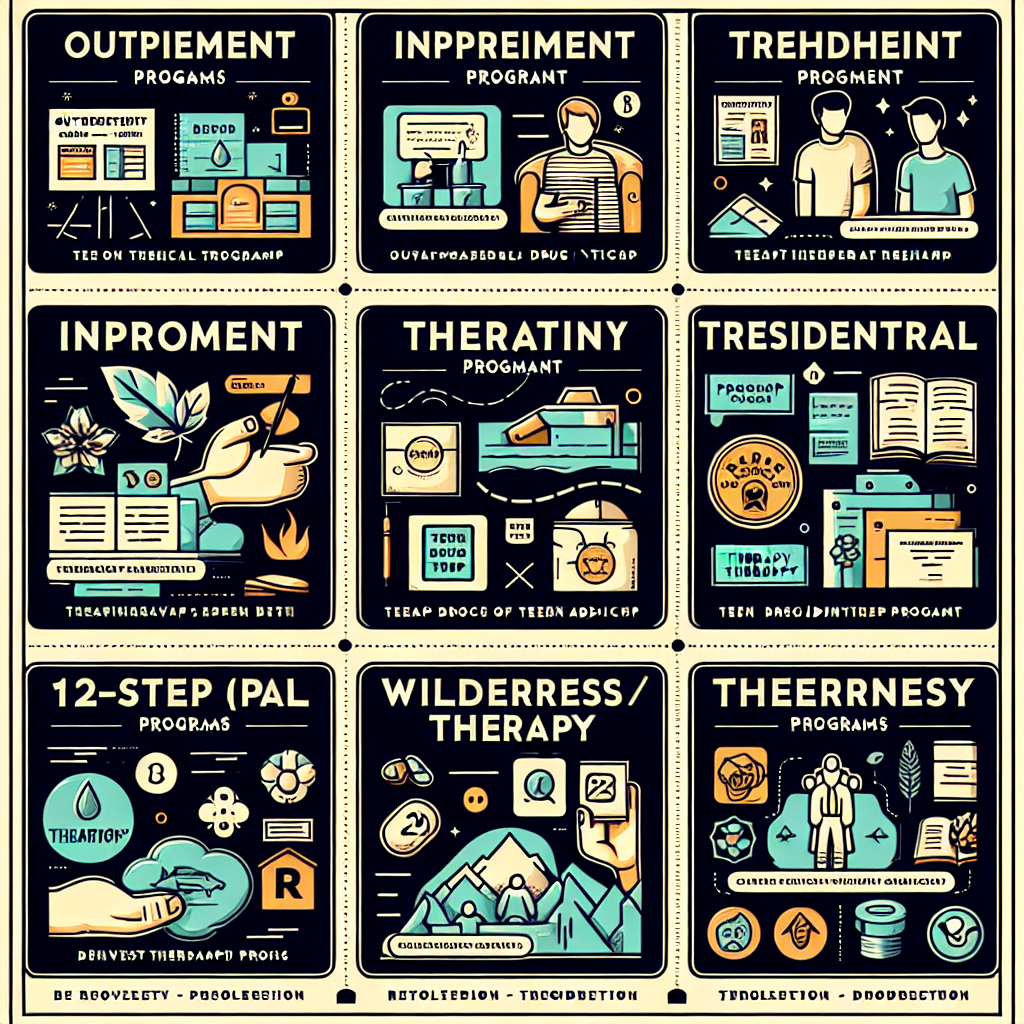-
Table of Contents

“Empowering Recovery: The Vital Role of Aftercare in Teen Addiction Rehabilitation”
Introduction
The Importance of Aftercare Following Teen Rehab for Addiction
Aftercare is a critical component in the continuum of care for teens recovering from addiction. While the initial phase of rehabilitation focuses on detoxification and intensive therapy, aftercare ensures that the progress made during rehab is sustained over the long term. Adolescents are particularly vulnerable to relapse due to the ongoing development of their brains, peer pressure, and the challenges of navigating social environments. Effective aftercare programs provide ongoing support, counseling, and resources that help teens reintegrate into their daily lives while maintaining sobriety. These programs often include individual therapy, group sessions, family counseling, and educational support, all tailored to address the unique needs of teenagers. By prioritizing aftercare, we can significantly improve the chances of long-term recovery and help teens build a foundation for a healthier, substance-free future.
The Role of Family Support in Aftercare Following Teen Rehab for Addiction
The journey to recovery from addiction is a challenging path, especially for teenagers who are still in the formative years of their lives. While completing a rehabilitation program is a significant milestone, it is merely the beginning of a lifelong commitment to sobriety. One of the most crucial elements in ensuring sustained recovery is the role of family support in aftercare. The importance of this support cannot be overstated, as it provides the emotional, psychological, and sometimes even physical scaffolding that teens need to navigate the complexities of life post-rehab.
Family support serves as a cornerstone in the aftercare process, offering a stable and nurturing environment that fosters healing and growth. When a teenager returns home after rehab, they are often met with a world that is both familiar and daunting. The triggers and stressors that may have contributed to their addiction still exist, and it is within this context that family support becomes indispensable. By creating a safe and understanding home environment, families can help mitigate these triggers, making it easier for the teen to focus on their recovery.
Moreover, open communication within the family can significantly enhance the effectiveness of aftercare. Encouraging honest and non-judgmental conversations allows the teenager to express their fears, struggles, and triumphs. This open dialogue not only helps in identifying potential relapse triggers but also strengthens the emotional bond between family members. When teens feel heard and understood, they are more likely to reach out for help when they need it, rather than turning to substances as a coping mechanism.
In addition to emotional support, families can play a pivotal role in helping teens adhere to their aftercare plans. These plans often include attending support group meetings, therapy sessions, and engaging in healthy activities. By actively participating in these aspects of aftercare, families can demonstrate their commitment to the teen’s recovery. Simple actions like providing transportation to therapy sessions or joining a family support group can make a world of difference. This involvement not only reinforces the importance of the aftercare plan but also shows the teen that they are not alone in their journey.
Furthermore, educating the entire family about addiction and recovery can be incredibly beneficial. Understanding that addiction is a disease rather than a moral failing can shift the family’s perspective, fostering a more compassionate and supportive approach. Many rehab programs offer family education sessions, which can equip family members with the knowledge and tools they need to support their loved one effectively. This education can also dispel myths and reduce the stigma associated with addiction, creating a more accepting and supportive home environment.
It is also essential to recognize that family support in aftercare is a two-way street. While the family provides support to the recovering teen, the process can also be an opportunity for the family to heal and grow. Addiction often affects the entire family unit, and recovery can be a time for rebuilding trust and strengthening relationships. By working together, families can create a resilient support system that benefits everyone involved.
In conclusion, the role of family support in aftercare following teen rehab for addiction is multifaceted and profoundly impactful. It provides the emotional and practical support necessary for sustained recovery, fosters open communication, and helps in adhering to aftercare plans. By educating themselves about addiction and actively participating in the recovery process, families can create a nurturing environment that not only supports the teen but also promotes healing for the entire family. Through unwavering support and understanding, families can inspire hope and resilience, guiding their loved ones toward a brighter, sober future.
Effective Strategies for Maintaining Sobriety in Teens Post-Rehab
The journey to sobriety for teens grappling with addiction is a challenging and transformative process. While completing a rehabilitation program is a significant milestone, it is merely the beginning of a lifelong commitment to maintaining sobriety. The importance of aftercare following teen rehab for addiction cannot be overstated, as it plays a crucial role in ensuring long-term recovery and preventing relapse. Effective strategies for maintaining sobriety in teens post-rehab are essential to support their ongoing journey towards a healthier, substance-free life.
One of the most effective strategies for maintaining sobriety is the establishment of a robust support system. This includes family, friends, and support groups who understand the challenges of addiction and are committed to providing encouragement and accountability. Family involvement is particularly vital, as it fosters a nurturing environment where teens feel safe and supported. Open communication within the family can help address any underlying issues that may have contributed to the addiction, thereby reducing the risk of relapse.
In addition to a strong support system, ongoing therapy and counseling are critical components of aftercare. Individual therapy allows teens to continue exploring the root causes of their addiction and develop coping mechanisms to handle stress and triggers. Group therapy, on the other hand, provides a sense of community and shared experience, which can be incredibly empowering. It reminds teens that they are not alone in their struggles and that others have successfully navigated similar challenges.
Another key strategy is the development of healthy routines and habits. Structure and consistency can provide a sense of stability that is often lacking in the lives of those recovering from addiction. Encouraging teens to engage in regular physical activity, pursue hobbies, and maintain a balanced diet can significantly enhance their overall well-being. These positive lifestyle changes not only improve physical health but also boost mental and emotional resilience, making it easier to resist the temptation of substance use.
Education and vocational training also play a pivotal role in aftercare. By focusing on academic and career goals, teens can build a sense of purpose and direction. This forward-looking approach helps shift their focus away from past behaviors and towards a brighter future. Schools and vocational programs that offer support for students in recovery can be instrumental in helping teens stay on track and achieve their aspirations.
Moreover, mindfulness and stress management techniques are invaluable tools for maintaining sobriety. Practices such as meditation, yoga, and deep-breathing exercises can help teens manage anxiety and stress, which are common triggers for relapse. By incorporating these techniques into their daily routine, teens can develop a greater sense of self-awareness and emotional regulation.
It is also important to recognize the role of peer influence in a teen’s recovery journey. Encouraging teens to build relationships with peers who support their sobriety can create a positive social network. Conversely, it is crucial to avoid environments and individuals that may encourage substance use. This may involve making difficult decisions about friendships and social activities, but it is a necessary step to safeguard their recovery.
Lastly, setting realistic and achievable goals is essential for maintaining motivation and a sense of accomplishment. Celebrating small victories along the way can reinforce positive behavior and build confidence. It is important for teens to recognize that recovery is a gradual process, and setbacks are a natural part of the journey. With perseverance, support, and effective aftercare strategies, teens can successfully navigate the challenges of post-rehab life and embrace a future filled with hope and possibility.
Q&A
1. **Why is aftercare important following teen rehab for addiction?**
Aftercare is crucial because it provides ongoing support and resources to help teens maintain sobriety, prevent relapse, and address any underlying issues that may contribute to their addiction.
2. **What are some common components of aftercare programs for teens recovering from addiction?**
Common components include individual and group therapy, family counseling, support groups, educational and vocational training, and regular monitoring and follow-up appointments.
Conclusion
Aftercare following teen rehab for addiction is crucial for sustained recovery and long-term success. It provides ongoing support, helps teens develop coping strategies, and reinforces the skills learned during treatment. Aftercare programs, such as counseling, support groups, and continued education, address the unique challenges teens face, reducing the risk of relapse. By maintaining a structured and supportive environment, aftercare ensures that teens can navigate the complexities of their lives while staying committed to their recovery journey.



